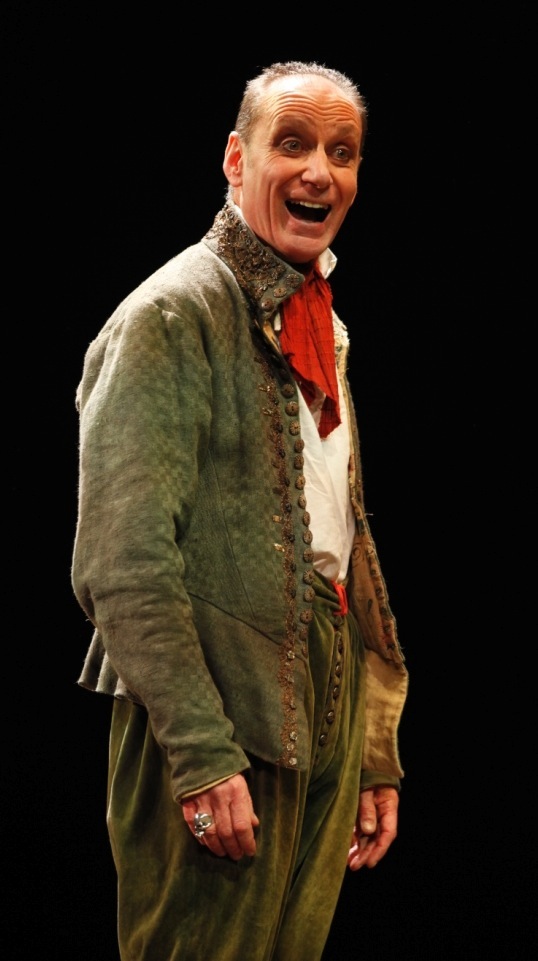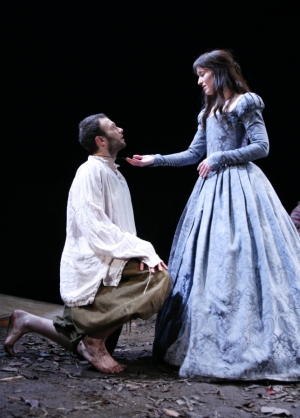Best sit upstairs in the Rose for their new As You Like It, Stephen Unwin's first Shakespeare production in the three-year-old theatre, modelled on the Elizabethan principle. The tilted perspective helps a great deal with the sparse little bit of scenery. From the ground stalls the hummock of leaf-strewn earth and the three oak branches hanging overhead seriously lack the forcefield of a Forest of Arden, hemmed in with black unadorned walls and exit doors.
Shakespeare’s Arden should be a surreal place, where people lose their court inhibitions, where they’re far from hot water and clean underwear, yet where life on the run is a hippy-dippy picnic with erotic foreplay and crossdressing. The play overflows with lipsmacking lines, aphorisms, idyllic songs for a rural utopia - “Under the greenwood tree”, “Sweet are the uses of adversity”, “It was a lover and his lass” and that magnetic, sombre passage of Jaques's which seems to have strayed from a parallel, corrective universe, “All the world’s a stage”. With so much language to feast on, and the lightheartedness of the games, one hopes for diversion, a little fantasy, even giddiness.
But designer Jonathan Fensom leaves the Rose’s black cyclorama undisguised behind the oak branches, with no projection, visions or colours to take us to Shakespeare’s stimulating little planet of pretence. Equally, though there is music, to which the actors sing along with the lutenist, it is that lentils-and-beards strumming stuff that turns up so often in theatre, sans tune, sans rhythm, sans flair, sans everything.
 In this dry setting, Adrian Lukis’s Jaques (main picture) has a rich, nourishing individuality that I drank in with relief: an indolent, intelligent man who has tagged along reluctantly with the banished Duke to his Robin Hood existence without subscribing to the adolescent fantasy. He’s testy, scruffy, faintly Blackadderish. He stares at the sky, sniffing suspiciously as if anticipating the next damn shower, and has one of my favourite lines: “Goodbye - let’s meet as little as we can.” Everything in Lukis’s voice and body brought Jaques alive, the resigned vagaries of thought as he watched others in their idiotic games, and a shifty body language that hinted at backache and laziness.
In this dry setting, Adrian Lukis’s Jaques (main picture) has a rich, nourishing individuality that I drank in with relief: an indolent, intelligent man who has tagged along reluctantly with the banished Duke to his Robin Hood existence without subscribing to the adolescent fantasy. He’s testy, scruffy, faintly Blackadderish. He stares at the sky, sniffing suspiciously as if anticipating the next damn shower, and has one of my favourite lines: “Goodbye - let’s meet as little as we can.” Everything in Lukis’s voice and body brought Jaques alive, the resigned vagaries of thought as he watched others in their idiotic games, and a shifty body language that hinted at backache and laziness.
He was only roused when annoyed by the popularity of Michael Feast’s competing entertainments (pictured left) as the strenuously verbose Touchstone in a silly hat, another spirited and credible performance. Good work too from Shango Baku’s Adam, the old retainer, whose warbling Jamaican voice and loose, almost jazzy body language threw the stiff anonymity of the carriage of most of the other actors into contrast.
The great choreographer Martha Graham insisted, “The body cannot lie.” She's right. In reality, people can’t help betraying themselves with how they move, but here, under Stephen Unwin’s direction, there was much standing and delivering with hands lifelessly hanging at the sides of smart period costumes. The physical stolidness was evident from the start, in the two neatly effective duets with which Shakespeare introduces the four main characters (lovers, eventually): a pair of brothers at war, punching each other down, and a pair of cousins, sisters in arms and in total harmony. Room for an eloquent body language revealing their backstories, one would think, but the playing of neither of these introductory scenes brought from the actors much emotional freight in gesture or sense of physical comfort or discomfort with each other.
Georgina Rich (Rosalind), Paul Shelley (the Dukes) and William Tapley (Oliver) looked cut out of cardboard in much of the first half. Characters whose words are hard to create a credible arc from (such as the wretch Oliver) can easily work with an eloquent body language in attendance. David Sturzaker (Orlando) delivered the wired resentment in part one at being the Cinderella of his family rather earnestly, without the touch of quixotic charm that would turn him believably into the wry, lovesick poetaster of part two who hangs left-footed odes on trees.
 This had something to do with his gabbling of his role, an even more marked demerit of Rich’s Rosalind (the pair pictured right in part one). Though she makes a lovely teenaged boy to look at, she rushed her lines, her voice rose higher and lost weight, and with the mistiming went some of the sizzle and grace of the language games Rosalind’s playing. Rich may solve this as the run goes on, but the pretend love encounters between Orlando and “Ganymede” also run too antiseptic, innocent of homosexual naughtiness. Rosalind’s epilogue - that odd little throwaway speech to the audience that half-excuses the play’s destabilising sexual suggestiveness - was, well, uncalled for.
This had something to do with his gabbling of his role, an even more marked demerit of Rich’s Rosalind (the pair pictured right in part one). Though she makes a lovely teenaged boy to look at, she rushed her lines, her voice rose higher and lost weight, and with the mistiming went some of the sizzle and grace of the language games Rosalind’s playing. Rich may solve this as the run goes on, but the pretend love encounters between Orlando and “Ganymede” also run too antiseptic, innocent of homosexual naughtiness. Rosalind’s epilogue - that odd little throwaway speech to the audience that half-excuses the play’s destabilising sexual suggestiveness - was, well, uncalled for.
Fortunately, Phoebe Fox’s Celia, dressed like a Gainsborough shepherdess, was warmer, and despite the virtual vanishing of her role in later acts managed to cast speaking looks when she had hardly a line. She capped off the absurdity of her apparent coup de foudre for reformed bad brother Oliver with a delightful, actressy freeze - if it's what’s needed for the four-way grid of lovers to be completed, she wasn't going to spoil it. Georgia Maguire's Phoebe is also a sexy little piece, but the final wedding is truly ghastly, silly oak garlands, awful little calico shifts, bare legs and feet, candles, oafish dancing and that lumpen music of Corin Buckeridge. Tree-huggers and eco-nuts unite.
- A Rose Theatre production in association with Kingston University















Add comment